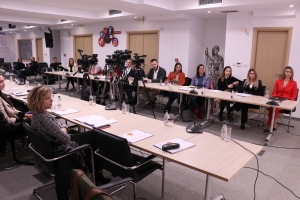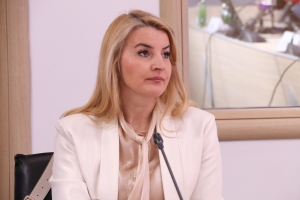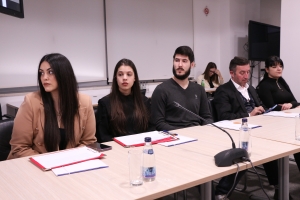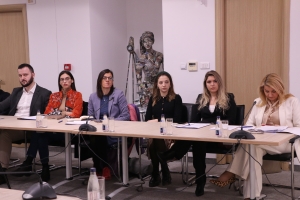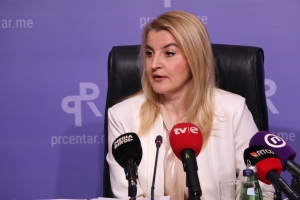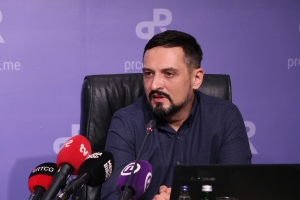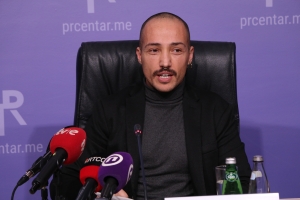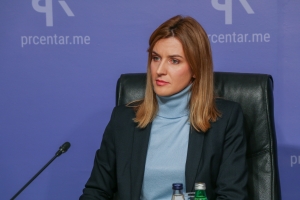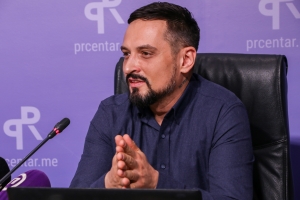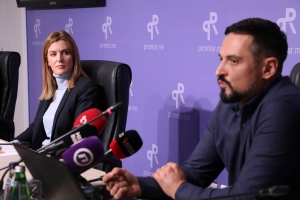Montenegro is back among the countries that have institutional homophobia, for the hatred and hate speech against LGBTIQ people are on the rise, and there is no adequate response from the authorities, as was stated at the conference of the Centre for Monitoring and Research (CeMI).
The Program Director of the Centre for Monitoring and Research (CeMI), Teodora Gilic, pointed out the findings of the survey conducted by that organization in August 2023, which showed that 60 percent of the citizens support conservative values and express a negative attitude towards the LGBT population.
"Negative and non-supportive attitude expresses itself more and more by hate speech that is present both on social media and online portals. As shown by the social media monitoring conducted by CeMI within this project, disrespect, insults, even threats towards the members of the LGBT community are particularly intensified in the period immediately before and during the Pride," Gilic stated at the conference "Creating a safer environment for LGBTI people."
According to her, the problem is that these kinds of comments are not getting removed, nor does the Law mandate that, even though they are mostly left on the posts of the Facebook and Instagram accounts of the established media.
"When it comes to hate crimes, past practice has shown that the attacks against the members of the LGBT community, because of their sexual orientation are often treated as offenses, and not as hate crimes," said Gilic.
She assessed that that is why it is important to educate the judiciary and other officials, to recognize hate speech and crimes committed out of hatred towards the LGBTI people because of their sexual orientation, and in that way influence that those kinds of cases be appropriately qualified and processed by the authorities.
"Therefore, the focus of our project, inter alia, was on the training of the judges, prosecutors, and the law enforcement about the sensible treatment of the LGBTI community, and the implementation of Article 42a of the Criminal Code of Montenegro because in the end, the Police Department, the Prosecutor’s Office, and the judges are the key actors in the protection of the rights of the LGBTI people against hate speech and hate crimes," Gilic stated.
The general director of the Directorate for the Promotion and Protection of Human Rights and Freedoms in the Ministry of Human and Minority Rights, Mirjana Pajkovic, said that the members of the LGBT population still face discrimination and violence in numerous social spheres.
"Despite that, there is hope that we can create a safer space for all people, regardless of their sexual orientation and gender identity," Pajkovic stated.
She pointed out that it is crucial to secure education programs which will help in suppressing the prejudice and stereotypes, but also to raise awareness about equality.
"Furthermore, the laws and policies play a key role in creating a safer space. The legal possibility of same-sex marriage, anti-discrimination laws, and the protection of the rights of transgender people should be the priority in this area," Pajkovic stated.
She believes that Civil Society Organizations provide important support, education, and legal help to the people who are facing discrimination based upon their sexual orientation and gender identity.
"The key value is everyone’s dedication in regard to advocating changes in legislation and policies that will secure a safer space for all," said Pajkovic.
Presenting the study "Hate speech against LGBTI people: Challenges and solutions," the co-executive director of the LGBTI Equal Rights Association for the Western Balkans and Turkey (ERA), Danijel Kalezic, said that in Montenegro the hatred and hate speech have long ago crossed the "red line," and that we do not have an adequate response from the state in regard to that state.
"It is probably the consequence of the fact that the institutions do not recognize or deny the problem that we have. Unfortunately, Montenegro is back among the countries that have institutional homophobia," Kalezic pointed out.
He clarified that the study is based on data gathered by monitoring social media and internet portals, conducting desk researches and interviews with relevant experts and stakeholders.
"Based on this monitoring, we have reached the key reasons among which is the high prevalence of hate speech. The social and traditional media, using the legal deficiencies and the bad practice of the competent institutions, often spread hatred and dehumanize the LGBTI people. This creates a climate of terror and discrimination," Kalezic stated.
He indicated that the monitoring showed that there are platforms for spreading misinformation, explaining that the online space and a number of media from the region broadcast a program in Montenegro that is used for spreading false information and negative stereotypes about the LGBTI people, additionally worsening the prejudice and intolerance.
"Anonymity on online platforms makes the tracking and identification of the perpetrators harder, which contributes to impunity. As a consequence of that, we have the fact that the victims of hatred feel unprotected and scared, which limits their free expression and participation in social life," said Kalezic.
According to him, even though there are penal provisions for hate speech, they are badly implemented, leaving the victims without justice and feeling unprotected.
"Unfortunately, we are noting that the LGBTI people often face discrimination in institutions, which is why several court proceedings are currently underway against Montenegro, which additionally creates mistrust and in that way hinders the reporting of hate speech. Additionally, the challenge is that numerous citizens are not sufficiently introduced to the rights of the LGBTI people and the harmful effects of hate speech," said Kalezic.
He gave three examples of hate speech towards LGBT people which were analyzed in the study – hate speech against master psychologist and psychotherapist Petar Markovic, hate speech caused by holding the 11th Montenegro Pride event, and the engagement of a gay couple on Lovcen.
Kalezic warned that in all the cases, the institutions did not react adequately and did not process the perpetrators of hate speech.
"One of the alarms that we as a society have lost feeling that all of that are cases of violence and it has been completely normalized because there is no adequate response from the institutions," Kalezic believes.
He stated that the institutions need to proactively research cases of hate speech and strictly implement penal provisions, and also that it is necessary to perform detailed analyses of the legislative framework and its implementation, and to then adapt it in a way that it facilitates the processing of the hate speech cases and provides adequate appropriate penal provisions which will be applicable in practice.
"Public education about LGBTI rights and the negative consequences of hate speech is crucial, and the law enforcement, judiciary system, healthcare, and education must undertake continuous training on how to recognize and adequately react to hate speech. Additionally, the LGBTI people should be supported to report hate speech and seek justice," said Kalezic.
During the panel "How to create a safer environment for LGBTI people?" the Deputy Ombudsperson in Montenegro, Nerma Dobardzic, indicated that there is a lack of awareness of the general public, and especially the youth, about the rights of the LGBTIQ population.
"All the system institutions should address this issue and react precisely and timely with deterrent sanctions. It is important to work on how to recognize hate speech directed towards the LGBTIQ population. I believe that it is necessary to work on raising awareness about the rights of the LGBTIQ people, primarily through the educational system starting from the youngest age," said Dobardzic.
She believes that it is necessary to work on improving the legal framework, as well as that the human rights and civic education should be compulsory subjects.
The CEO of the Spectra Association, Jovan Ulicevic, believes that how we treat the vulnerable groups in society is a litmus test of where we are with democracy.
"We need an essential approach to these subjects, not a formalistic one. We have serious forms of speech that normalize the neo-fascism of society, which completely relativizes hate speech and offensive speech, efficiently erasing the boundary between freedom of speech and what it actually is," said Ulicevic.
According to him, when we collectively and strategically switch to the attitudes to values and address which infrastructure is the one that 'hammers' the values into our system, "I believe that we can more efficiently address all these matters."
Kalezic said that they hold positions of power in their campaigns and methods "turning youth towards the right."
"Montenegro is not an exception. This is a global trend and nothing which is not already happening in the region and in the world is happening to us right now," said Kalezic.
The conference was held within the project "Contribution to suppressing the hate speech against LGBTI people" realized by the Centre for Monitoring and Research CeMI and is financially supported by the Ministry of Human and Minority Rights of Montenegro."

